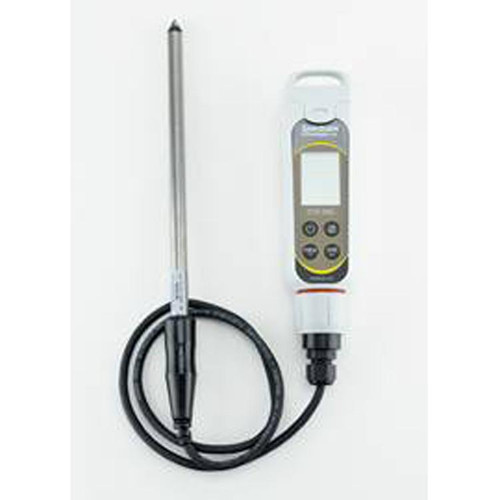Fast
Shipping
Quick,
Simple Ordering
Clear,
Upfront Pricing
Over 30,000
Happy Customers
Exceptional
Customer Service
Industry's Largest
Catalog
Field Scout EC Meter for Soil and Water Testing Accuracy
The Field Scout Direct Soil EC Meter, one of many conductivity meters, lets you measure salts in soil and water or nutrient solutions instantly. Use this portable EC meter and probe to measure soil salinity on golf greens, fairways and athletic fields right on the spot without having to do soil sampling and soil preparation. Just turn on, put soil EC probe in the ground and read the meter. The EC meter measures the electrical conductivity of the soil or water, which is a commonly measured parameter for assessing salt levels. The presence of ions allows it to transmit electricity, and a higher ionic concentration increases conductivity. The readings are at the tip of the probe so you can also see salinity levels at different depths of the soil profile by inserting the probe deeper. The device performs a calculation based on the measured conductivity to estimate salt levels. EC can be converted to TDS values using specific conversion factors. The meter may also employ an internal algorithm to estimate TDS and salinity from conductivity readings. Measures up to 7 1/2 inches deep (19cm). Also works in water or spray tanks.
Now with the Field Scout EC Soil Meter you can test different levels in the soil profile with the 8 inch long probe. You can also use the probe to fine tune your fertility program. The device is measuring electrical conductivity directly in the soil. Measurements can be made directly in the soil without pulling soil cores.
Turf managers can monitor for high salt levels on golf course greens and athletic fields with the Field Scout EC Soil Meter to know when to flush (leach) salts from the soil profile before turf quality declines, and can also use soil penetrometer tools for soil testing and compaction measurement. For accurate soil temperature measurements, consider the Pocket Digital Thermometer (F and C). You can also check your irrigation water quality or nutrient tank mixes with the same meter. The meter can provide both EC and TDS (EC TDS) readings for comprehensive analysis.
EC Meter Features
EC meters have the following features:
-
High Accuracy and Reliability: Measures conductivity accurately.
-
Automatic Temperature Compensation: Adjusts to temperature variations.
-
Fast and Easy to Use: Makes measuring EC easy.
-
Compact and Portable: On site measurements.
-
Wide Range: Measures a wide range of EC values.
-
Automatic Calibration: Makes calibration quick and easy, often with a standard calibration solution.
-
Factory Calibrated: Ready to use right out of the box.
-
Measures Total Dissolved Solids (TDS) Concentrations: Gives you an idea of the total dissolved solids which is important in many applications.
EC Meter Applications
EC are used in many applications:
-
Agriculture: Measure soil and water nutrient content to optimize plant growth.
-
Hydroponics: Measure the EC of nutrient solutions to ensure plants get the right amount of nutrients.
-
Water Treatment: Measure the EC of water to check treatment process effectiveness.
-
Swimming Pools: Measure the EC of pool water to know when to add chemicals, for safe and clean water.
Specifications with Auto Temp
-
Display: LCD digital
-
EC Range: 0.00 - 19.99 mS/cm (0 to 12,793 ppm)
-
Temperature Range:23 F to 131 F (-5 to 55 C)
-
Accuracy: EC: ±2% Full Scale
-
Temperature: ± 1.8 F (± 0.5 C)
-
EC Resolution: 0.01 mS/cm
-
Operating Environment:32 to 122 F (0 to 50 C)
-
Calibration: One point (1-point) calibration method, typically at 1.41 mS/cm or with 2.76 mS/cm standard, for quick and straightforward setup
-
Temperature Compensation: Auto from 32 to 122 F (0 to 50C)
-
Power: Four LR44 1.5V alkaline batteries
-
Kit includes: Case, calibration standard battery.
Common Problems
Users may experience some common issues with EC but can be resolved with simple troubleshooting:
-
Inaccurate: Make sure the meter is calibrated and maintained.
-
Electrode Contamination: Clean the electrode regularly to prevent buildup.
-
Temperature Variations: Use a meter with auto temp compensation.
-
Interference from other electrical devices: Use a meter with shielded probe or electrode.
By following these you can keep your EC meter accurate and reliable.
Best Practices for Using an EC Meter
To get accurate results and extend the life of your EC meter, follow these best practices:
-
Calibration & Cleaning: Calibrate periodically using quality standards. Clean and rinse the probe with distilled water after each use to avoid contamination.
-
Temperature Compensation: Use a meter with automatic temperature compensation (ATC) for reliable readings across different temperatures.
-
Proper Sampling: Rinse before testing, fully immerse the probe, and allow readings to stabilize before recording results.
-
Correct Interpretation: Compare EC and TDS values with recommended ranges for your application, such as hydroponics, pools, or water quality testing.
-
Regular Maintenance: Follow manufacturer guidelines for battery replacement, cleaning, and recalibration.
-
Right Meter Selection: Choose a meter with suitable range, auto-calibration, ATC, and portability for your needs.
-
EC–TDS Conversion: Use the correct conversion factor based on the solution type.
-
User Manual: Always follow the manufacturer’s instructions for best performance.
Following these steps ensures consistent, accurate EC measurements for water quality and nutrient monitoring.





